
ALIMENTARY PHARMACOLOGY & THERAPEUTICS
Scope & Guideline
Fostering Scientific Dialogue for Digestive Disease Solutions
Introduction
Aims and Scopes
- Gastrointestinal and Liver Disease Research:
The journal covers a wide array of gastrointestinal and liver diseases, highlighting research on pathophysiology, diagnosis, and treatment options. - Pharmacotherapy and Treatment Strategies:
AP&T emphasizes the role of pharmacotherapy in managing gastrointestinal and liver diseases, including studies on drug efficacy, safety, and guidelines for clinical practice. - Emerging Therapies and Interventions:
The journal frequently publishes research on novel treatment modalities, including biologics, small molecules, and innovative therapies for various digestive disorders. - Clinical Guidelines and Best Practices:
AP&T aims to provide evidence-based recommendations for clinicians, focusing on improving patient outcomes in gastrointestinal and liver diseases. - Patient-Centered Outcomes and Quality of Life:
The journal addresses the importance of patient-reported outcomes, quality of life, and the psychosocial aspects of managing chronic digestive diseases. - Epidemiological Studies and Public Health:
Research related to the epidemiology of gastrointestinal and liver diseases, including risk factors, prevalence, and the impact of public health initiatives, is a key focus area. - Technology and Innovation in Gastroenterology:
AP&T explores advancements in diagnostic and therapeutic technologies, including the use of machine learning and non-invasive testing methods in gastroenterology.
Trending and Emerging
- Metabolic Dysfunction-Associated Liver Disease (MAFLD):
Research on MAFLD is increasingly prominent, focusing on its clinical implications, pathophysiology, and treatment strategies, reflecting a growing recognition of its significance. - Biologics and Targeted Therapies:
The use of biologics and targeted therapies for inflammatory bowel disease (IBD) and other gastrointestinal conditions is a rapidly expanding area of research, with a focus on optimizing treatment regimens. - Artificial Intelligence and Machine Learning:
The application of AI and machine learning in predicting disease outcomes and personalizing treatment approaches is a growing trend, indicating a shift towards data-driven medicine. - Patient-Centered Care and Quality of Life:
There is an increasing emphasis on research that evaluates patient-reported outcomes and quality of life in the context of gastrointestinal diseases, aligning with broader trends in healthcare. - Public Health and Epidemiology:
Studies addressing the epidemiology of liver diseases and gastrointestinal disorders, as well as public health interventions, are gaining traction, reflecting an awareness of the societal impact of these conditions. - Gut Microbiome Research:
The exploration of the gut microbiome’s role in health and disease, particularly in IBD and liver diseases, is an emerging theme, highlighting its significance in therapeutic strategies. - Long-term Outcomes of Chronic Diseases:
Research focusing on the long-term outcomes of chronic gastrointestinal and liver diseases, including the impact of treatment on disease progression and survival, is becoming increasingly important.
Declining or Waning
- Traditional Dietary Interventions:
Research focusing solely on traditional dietary interventions for gastrointestinal diseases has seen reduced emphasis, as newer therapies and pharmacological approaches gain prominence. - Basic Science without Clinical Relevance:
Studies that do not translate into clinical applications or lack direct relevance to patient care are being published less frequently, as the journal prioritizes clinically impactful research. - Single-Center Studies:
There is a noticeable decline in the publication of single-center studies, with a shift towards multi-center and larger cohort studies that yield more generalizable results. - Isolated Pathophysiological Mechanisms:
Research focusing solely on isolated mechanisms of disease without exploring therapeutic implications or clinical outcomes is diminishing, reflecting a preference for integrated approaches. - Non-Pharmacological Treatments:
There appears to be a waning interest in non-pharmacological treatments for digestive diseases, as the journal increasingly emphasizes pharmacotherapy and innovative drug treatments.
Similar Journals
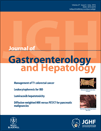
JOURNAL OF GASTROENTEROLOGY AND HEPATOLOGY
Elevating standards in gastrointestinal and liver disease research.Welcome to the JOURNAL OF GASTROENTEROLOGY AND HEPATOLOGY, an esteemed publication in the field of gastroenterology and hepatology, proudly published by WILEY. Established in 1986, this journal serves as a crucial platform for researchers, healthcare professionals, and students, presenting groundbreaking research and comprehensive reviews that drive advances in understanding and treating gastrointestinal and liver diseases. With a strong reputation evidenced by its Q1 ranking in gastroenterology and Q2 ranking in hepatology, this journal ranks impressively in the Scopus metrics - positioned at #22 out of 167 in gastroenterology and #21 out of 82 in hepatology, reflecting its contribution to scholarly excellence. Although it does not offer open access options, the journal’s rich archive and diverse topics make it indispensable for those dedicated to improving patient outcomes in these critical areas of medicine. Whether you are a seasoned researcher or an aspiring medical professional, engaging with this journal will keep you at the forefront of the latest developments and emerging trends in gastroenterology and hepatology research.

Gastroenterology
Shaping the Future of Gastroenterology Through Scholarly ImpactGastroenterology, published by W B Saunders Co-Elsevier Inc, is a premier journal dedicated to advancing the knowledge and practice within the fields of gastroenterology and hepatology. Established in 1945 and covering a wide range of topics related to digestive health, this journal holds a distinguished position in the academic community, as evidenced by its impressive Q1 status in both Gastroenterology and Hepatology categories, and its high rankings (4th in both disciplines) in Scopus, placing it in the top percentile for scholarly impact. With its commitment to publishing high-quality research, reviews, and clinical studies, Gastroenterology provides an essential resource for researchers, healthcare professionals, and students seeking cutting-edge insights that inform clinical practices and enhance patient care. Although it does not currently offer open access, the journal continues to serve as a vital platform for disseminating meaningful research that shapes the future of digestive disease management.

Korean Journal of Gastroenterology
Connecting Disciplines for Gastroenterological ExcellenceKorean Journal of Gastroenterology (ISSN: 1598-9992, E-ISSN: 2233-6869), published by the Korean Society of Gastroenterology, has been a premier outlet for research and advancements in the field of gastroenterology since its inception in 1968. This open-access journal, based in South Korea, fosters a global dialogue on gastrointestinal health, embracing contributions from a diverse array of disciplines within medicine. It is currently ranked in the Q4 quartile for miscellaneous medicine and holds a Scopus rank of #323 out of 636 in general medicine, reflecting its commitment to publishing impactful research despite its relatively recent establishment in high-impact metrics. With a continuous publication timeline extending through to 2024, the journal aims to enhance understanding of gastrointestinal disorders and promote innovative treatments, making it an essential resource for researchers, clinicians, and students alike who seek to stay abreast of the latest developments and clinical applications in gastroenterology.
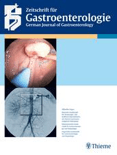
ZEITSCHRIFT FUR GASTROENTEROLOGIE
Elevating Research Standards in GastroenterologyZEITSCHRIFT FUR GASTROENTEROLOGIE, published by GEORG THIEME VERLAG KG, stands as a notable journal in the field of gastroenterology since its inception in 1971. With an ISSN of 0044-2771 and an E-ISSN of 1439-7803, this journal focuses on advancing knowledge and research in gastrointestinal health. Operating from Germany, its contributions span various aspects of gastroenterology, providing a platform for both established and emerging scholars to share their findings. As of 2023, ZEITSCHRIFT FUR GASTROENTEROLOGIE is ranked in the Q3 quartile in Gastroenterology and Q4 in Medicine (miscellaneous), reflecting its critical yet developing role in the academic community. Despite its current Scopus rank of #117 out of 167 in the gastroenterology category, the journal aims to foster innovative research and discussions vital for tackling contemporary challenges in gastrointestinal medicine. While it does not offer open access, the journal's extensive archival rigor ensures that pertinent studies remain accessible to professionals and academicians seeking to deepen their understanding and engage with evolving clinical practices.
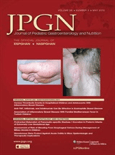
JOURNAL OF PEDIATRIC GASTROENTEROLOGY AND NUTRITION
Leading the way in pediatric gastroenterology and nutrition advancements.Journal of Pediatric Gastroenterology and Nutrition is a premier academic journal published by Wiley, focusing on the critical intersection of pediatric gastroenterology and nutrition. Established in 1982, this journal has been at the forefront of research and clinical practices for over four decades and continues to contribute invaluable insights to the fields of pediatrics and gastrointestinal health, boasting a Q1 ranking in Pediatrics, Perinatology and Child Health and a Q2 ranking in Gastroenterology as of 2023. The journal features a comprehensive array of original research, review articles, and clinical studies aimed at improving the understanding and management of pediatric gastrointestinal disorders and nutrient imbalances. Edited with expertise, the Journal of Pediatric Gastroenterology and Nutrition serves as an essential resource for clinicians, researchers, and students dedicated to advancing the well-being of children with digestive health issues. Readers can access the journal's impactful research studies through traditional subscriptions.
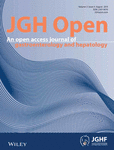
JGH Open
Empowering the Future of Gastrointestinal MedicineJGH Open is a prominent open-access journal dedicated to advancing knowledge in the fields of Gastroenterology and Hepatology, published by WILEY. Since its inception in 2017, the journal has served as a crucial platform for researchers, professionals, and students to disseminate innovative research findings and clinical insights. With an impact factor and Scopus rankings reflecting its steady growth—ranking in the 3rd quartile for both Gastroenterology (Q3) and Hepatology (Q3)—JGH Open is positioned within the competitive landscape of medicine. Its commitment to open access enhances the visibility and accessibility of high-quality research, ensuring that significant advancements in understanding diseases of the gastrointestinal tract and liver reach a broad audience. With a focus on collaboration and dissemination of knowledge, JGH Open aims to contribute to the global discourse and improve outcomes in gastrointestinal health.
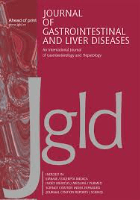
Journal of Gastrointestinal and Liver Diseases
Exploring Innovations in Digestive MedicineThe Journal of Gastrointestinal and Liver Diseases, published by MEDICAL UNIV PRESS in Romania, serves as a pivotal platform for the dissemination of significant research in the fields of gastroenterology and hepatology. Established in 2006, this journal has evolved over the years, currently holding a Q3 rank in Gastroenterology and a Q2 rank in Medicine (miscellaneous), reflecting its commitment to high-quality scholarship and impactful contributions to medical science.
With an ISSN of 1841-8724 and an E-ISSN of 1842-1121, the journal engages a diverse readership of researchers, clinicians, and students passionate about advancing knowledge in gastrointestinal and liver health. While it currently does not operate under an open access model, the journal remains a vital resource for those seeking to stay updated on the latest developments and emerging trends in the field. As it converges towards a broader impact, projected through its coverage until 2024, the Journal of Gastrointestinal and Liver Diseases continues to contribute to the academic landscape, encouraging innovation and comprehensive understanding in digestive health.
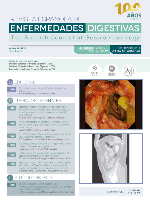
REVISTA ESPANOLA DE ENFERMEDADES DIGESTIVAS
Exploring innovative solutions in gastroenterology.REVISTA ESPANOLA DE ENFERMEDADES DIGESTIVAS, a pivotal Open Access journal published by ARAN EDICIONES, S A, has been at the forefront of advancing the field of gastroenterology since its inception in 1990. With a robust commitment to disseminating high-quality research, the journal provides a platform for researchers, clinicians, and students to share innovative findings and insights concerning digestive diseases. The journal is characterized by its Q3 ranking in both Gastroenterology and Miscellaneous Medicine categories, indicative of its significant contributions to these fields, and is positioned within the 36th percentile of Scopus rankings for medicine related to gastroenterology. Based in Spain, REVISTA ESPANOLA DE ENFERMEDADES DIGESTIVAS has embraced the Open Access model since 2004, ensuring that its articles are readily available to a global audience without financial barriers. The journal not only supports academic discourse but also plays a crucial role in improving clinical practices and health outcomes related to digestive health.

Gut and Liver
Elevating standards in Gastroenterology and Hepatology.Gut and Liver is a prestigious peer-reviewed journal dedicated to advancing the fields of Gastroenterology and Hepatology. Published by the EDITORIAL OFFICE GUT & LIVER in South Korea, this Open Access journal has been disseminating valuable research findings since 2007, making critical knowledge accessible to a global audience. With an impressive 2023 impact factor that places it in Q1 rank in both Gastroenterology (#28/167) and Hepatology (#22/82), it is recognized as a leader in the medical domain. The journal covers diverse topics, including innovative therapeutic strategies, clinical practices, and groundbreaking research in liver diseases and gastrointestinal disorders, thereby playing a vital role in improving patient care and outcomes. Researchers, healthcare professionals, and students can benefit from the journal's wealth of information, designed to foster collaboration and spark new ideas within the scientific community. For further engagement with current research, readers can access issues from 2009 to 2024 and stay updated on the latest advancements in the field.

Clinical Gastroenterology and Hepatology
Elevating Standards in Gastroenterology and HepatologyClinical Gastroenterology and Hepatology, published by Elsevier Science Inc, stands as a leading journal in the fields of gastroenterology and hepatology. With an ISSN of 1542-3565 and an E-ISSN of 1542-7714, this esteemed publication has earned its place in the top quartile (Q1) of both gastroenterology and hepatology categories as of 2023, ranking 6th out of 167 and 7th out of 82 respectively. The journal aims to disseminate innovative research, clinical studies, and case reports that advance the understanding and treatment of gastrointestinal and liver diseases. Targeted towards researchers, healthcare professionals, and students, it provides crucial insights into emerging therapies and medical advancements. Clinical Gastroenterology and Hepatology is not only a pivotal resource for contemporary gastroenterological research but also fosters collaboration and knowledge-sharing within the medical community. With a converging publication history from 2003 to the present, the journal continues to build on its solid foundation of scientific excellence and relevance.